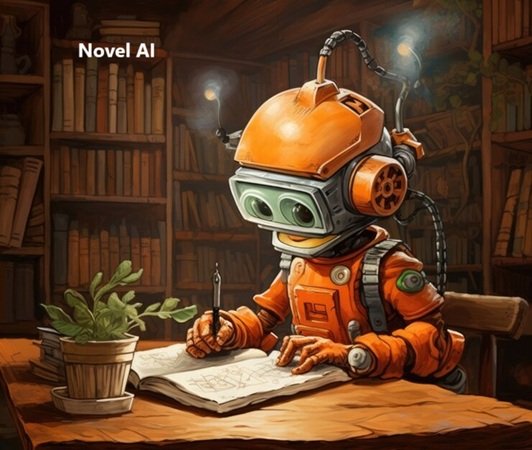In today’s fast-evolving world of technology, artificial intelligence (AI) is pushing the boundaries of what we thought was possible in various fields. One of the most exciting and innovative applications of AI is in creative writing, particularly through platforms like Novel AI. Whether you’re a seasoned author looking for a fresh approach or an aspiring writer seeking a powerful tool to boost your creativity, Novel AI is emerging as a fascinating solution.
What is Novel AI?
Novel AI is an AI-powered writing assistant designed to help individuals create stories, novels, and other written content. At its core, Novel AI uses cutting-edge machine learning algorithms to assist writers in generating text that flows naturally, offering suggestions for dialogue, descriptions, and plot development. The platform isn’t just about automation; it’s about enhancing the creative process by allowing users to input their preferences, create unique settings, and even mimic the writing style of famous authors.
How Novel AI Works: The Role of Machine Learning
The driving force behind Novel AI is machine learning—specifically, deep learning models trained on massive amounts of text data. These models can predict the next word, sentence, or even paragraph based on the input provided by the user. As the AI learns from a wide range of literary genres and writing styles, it becomes capable of generating text that feels coherent and engaging, almost as if it were written by a human.
The Rise of AI in Creative Writing
From Data to Dialogue: How AI Generates Content
AI-powered writing platforms like Novel AI are part of a larger trend of using technology to assist in creative processes. These systems learn from vast databases of literature, enabling them to generate realistic dialogue, descriptive scenes, and even emotional character interactions. Writers can input a basic idea or scenario, and the AI helps bring that vision to life by expanding on it in various ways.
The Growing Popularity of AI in Literature
As AI continues to evolve, it’s becoming more common for writers, publishers, and content creators to turn to AI tools to enhance their work. The ability to quickly generate high-quality text is appealing to many, especially in fields like blogging, content marketing, and fiction writing. This trend has sparked both excitement and debate, as people question whether AI could eventually replace human writers.
Key Features of Novel AI
Advanced Text Generation Capabilities
One of the standout features of Novel AI is its ability to generate long-form content, including stories, novels, and scripts. By analyzing the user’s input and preferences, Novel AI can continue narratives, offer plot twists, or develop new character arcs, all while staying true to the user’s chosen style.
Customization Options for Writers
Novel AI provides various customization tools, allowing writers to adjust the tone, genre, and voice of the text. Whether you want your writing to mimic a classic author like Jane Austen or follow a specific genre like science fiction, the platform offers flexibility in shaping the output to match your vision.
Story Continuation and Plot Assistance
For writers stuck in the middle of a story, Novel AI’s story continuation feature can be a lifesaver. By analyzing the context of previous chapters, the AI can propose logical and creative ways to move the plot forward, helping writers break through blocks that often come with storytelling.
AI’s Ability to Mimic Writing Styles
Novel AI’s deep learning models are designed to adapt to a variety of writing styles, which means it can analyze a few paragraphs and continue writing in a voice that closely matches the original. This can be especially helpful for writers looking to maintain a consistent tone throughout their work.
How Novel AI Benefits Writers
Overcoming Writer’s Block with AI Support
Every writer faces the dreaded moment of writer’s block. Novel AI helps overcome this challenge by providing instant suggestions or generating the next segment of the story, allowing writers to keep their momentum going even when inspiration feels low.
Enhancing Productivity for Authors
Novel AI isn’t just a tool for generating creative content; it also helps increase productivity. By speeding up the brainstorming process and helping writers flesh out ideas faster, Novel AI enables authors to focus more on refining their stories rather than getting stuck on the initial draft.
Novel AI as a Tool for Idea Generation
Struggling to come up with fresh ideas? Novel AI is equipped with features that can suggest new storylines, settings, and characters based on minimal input. This makes it a valuable brainstorming partner for writers working on their next big project.
Challenges and Limitations of Using Novel AI
Creativity Versus Algorithm: Can AI Match Human Imagination?
While Novel AI is an impressive tool, it’s important to acknowledge its limitations. AI generates content based on patterns in data, which means it can struggle with truly original thought. Human imagination, with its ability to create unique worlds, emotions, and experiences, remains difficult for AI to replicate fully.
Ethical Concerns in AI-Generated Content
As AI continues to develop, ethical questions arise about authorship and intellectual property. If a piece of writing is generated by an AI, who owns the content? Additionally, the use of AI-generated content without proper attribution could blur the lines of plagiarism, creating legal challenges in the publishing world.
Limitations in Narrative Depth and Character Development
While Novel AI can help writers craft coherent stories, it sometimes falls short in delivering complex character arcs or profound narrative depth. The emotional nuances and subtext that human writers naturally weave into their stories can be difficult for AI to emulate, making human input crucial for well-rounded storytelling.
Popular Applications of Novel AI
Novel AI for Fiction Writers
Novel AI is rapidly gaining traction among fiction writers. Whether you’re a novice writer or an experienced author, the platform offers an innovative way to experiment with storytelling. Writers can use it to develop new ideas, explore alternative plotlines, or even create entire stories from scratch. One of the key advantages of Novel AI for fiction writers is its ability to handle different genres seamlessly. Whether it’s sci-fi, fantasy, romance, or thriller, the AI can adapt its narrative style to suit the genre, providing writers with the tools they need to create immersive worlds and compelling characters.
AI-Powered Screenwriting and Dialogue Creation
For screenwriters, Novel AI can be a game-changer. Writing compelling dialogue that feels authentic is one of the most challenging aspects of screenwriting. Novel AI assists by generating dialogue that matches the tone, style, and personality of the characters. Screenwriters can input a few key details, and the AI can generate conversations that feel organic and relevant to the storyline. This feature is particularly useful in speeding up the drafting process, helping screenwriters refine their scripts faster without sacrificing creativity.
AI in Blogging and Content Marketing
Bloggers and content marketers are also turning to AI platforms like Novel AI to enhance their productivity. The platform helps generate blog posts, marketing copy, product descriptions, and other forms of digital content in a fraction of the time it would take a human writer. Novel AI can assist with brainstorming blog ideas, creating catchy headlines, and even drafting entire articles. Its versatility makes it a valuable tool for content creators who need to produce high-quality content consistently to engage their audience and maintain a strong online presence.
How to Get Started with Novel AI
Creating an Account and Exploring Features
Getting started with Novel AI is relatively simple. Users can sign up for an account on the platform’s website, where they will be guided through the setup process. Upon registration, users are given access to a range of features designed to enhance their writing. One of the first steps is exploring the various text generation tools, which include story prompts, dialogue suggestions, and even full narrative continuations.
Tips for First-Time Users
For first-time users, it can be overwhelming to figure out how to integrate Novel AI into their writing process. Here are some helpful tips:
- Start Small: Begin by using Novel AI for small tasks, like generating a few lines of dialogue or brainstorming plot ideas.
- Experiment with Genres: Explore different genres and writing styles to see how the AI adapts. This can give you a better understanding of its capabilities.
- Set Parameters: Take advantage of customization features to set specific parameters for tone, style, and character voices.
- Review and Edit: Always review the generated content to ensure it aligns with your vision. While Novel AI is highly advanced, human input is still essential for refining and personalizing the text.
Is Novel AI the Future of Writing?
The Impact of AI on the Future of Storytelling
Novel AI has sparked a lot of discussion about the future of storytelling. The platform is more than just a tool for generating text; it represents a new way of thinking about creativity and collaboration between humans and machines. AI-driven storytelling opens up possibilities for creating stories that are more interactive, personalized, and adaptive to individual readers’ preferences.
For example, in the future, we might see AI being used to create personalized novels that adjust the plot based on the reader’s input or preferences. This level of interactivity could revolutionize how stories are told and consumed, offering a more immersive experience that traditional methods cannot provide.
Will AI Replace Human Writers?
One of the most debated questions is whether AI will eventually replace human writers. While AI can significantly enhance the writing process, it’s unlikely to fully replace human creativity. Writing is not just about stringing words together—it’s about expressing emotions, exploring complex themes, and connecting with readers on a deeper level. AI excels at producing coherent text, but it struggles with the nuanced understanding of human experiences that great writing requires. In the end, AI is more likely to serve as a valuable tool for writers rather than a replacement.
Comparing Novel AI with Traditional Writing Methods
Speed vs. Depth: AI Writing Compared to Human Writing
One of the key differences between AI-generated writing and traditional methods is the speed at which content is produced. Novel AI can generate a large volume of text quickly, making it an excellent tool for brainstorming and first drafts. However, the depth and emotional resonance of the writing may be lacking compared to a human writer’s touch. Human writers can draw from personal experiences, emotions, and cultural contexts, which adds a layer of complexity and richness that AI struggles to replicate.
Collaboration Between AI and Human Writers
Rather than viewing AI as a competitor, many writers see it as a collaborative tool. Novel AI can handle the more mechanical aspects of writing—such as generating plot ideas, suggesting dialogue, or continuing a story—while human writers focus on refining and adding depth to the narrative. This collaboration allows writers to streamline the creative process while still maintaining control over the final product. It’s a synergy that can result in both more efficient and more creative outcomes.
The Role of AI in the Publishing Industry
How Publishers Are Using AI to Find New Talent
The publishing industry is beginning to adopt AI not only for writing but also for talent scouting. Some publishers are using AI to analyze submissions for originality, writing style, and potential marketability. This allows them to sift through a large number of manuscripts more efficiently, helping them discover new writers and stories that might otherwise go unnoticed. While human editors still play a critical role in evaluating the content, AI provides an additional layer of analysis that speeds up the process.
AI-Assisted Editing and Proofreading
Editing and proofreading are time-consuming tasks, but AI tools like Novel AI can assist with these processes as well. AI-powered editing tools can quickly identify grammatical errors, suggest improvements in sentence structure, and even offer alternative word choices. This not only saves time for editors but also helps improve the overall quality of the writing. However, human editors are still necessary to catch more subtle issues related to tone, voice, and narrative consistency.
Novel AI’s Place in Academic and Technical Writing
Can AI Handle Academic Complexity?
While Novel AI excels in creative writing, its application in academic and technical writing is still developing. Academic writing requires a deep understanding of specific subjects, as well as the ability to analyze data and construct well-supported arguments. While AI can help generate basic content or assist with formatting, it may struggle with the level of expertise required for complex topics. That being said, AI tools can still be useful for tasks such as generating research summaries, organizing information, and creating draft versions of papers.
The Use of AI in Research Paper Writing
AI is increasingly being used in research environments to assist with paper writing. Novel AI and similar tools can help researchers generate coherent drafts, identify key points in large datasets, and streamline the writing process. However, AI’s role in research writing is more supportive than transformative—it aids in efficiency but does not replace the critical thinking and expertise that human researchers bring to the table.
The Ethics of AI in Creative Industries
Copyright Issues and AI-Generated Works
One of the most significant ethical concerns surrounding AI-generated content is copyright. If an AI writes a novel, screenplay, or any other creative work, who owns the rights to that content? Currently, there is no clear legal framework for ownership of AI-generated works, leading to questions about how copyright laws will evolve as AI becomes more prevalent in creative industries.
Who Owns the AI’s Creation?
Another pressing question is whether the creators of the AI (the developers and programmers) or the users of the AI (the writers who input the prompts) should own the final product. Some argue that since the AI was trained on vast datasets, including works created by humans, the content it produces should not be owned by any single entity. This issue remains a gray area, with potential legal battles looming as AI continues to disrupt traditional creative processes.
The Future Developments of Novel AI
Potential Enhancements and Upcoming Features
The future of Novel AI looks bright, with many potential enhancements on the horizon. Developers are working to make the AI even more intuitive, with better understanding of narrative structures, character development, and emotional depth. Upcoming features could include more interactive storytelling options, where users can guide the narrative in real-time or create stories that respond to reader input. Additionally, improvements in AI’s ability to mimic specific writing styles could lead to even more personalized content creation.
AI’s Growing Influence in Creative Industries
As AI becomes more advanced, its influence on creative industries will only continue to grow. From writing and publishing to filmmaking and marketing, AI tools like Novel AI will play an increasingly central role in how content is created, distributed, and consumed. While AI may never fully replace human creativity, its ability to augment and enhance the creative process makes it an indispensable tool for the future.
User Experiences and Feedback on Novel AI
What Writers Are Saying About Novel AI
The feedback from writers using Novel AI has been overwhelmingly positive. Many writers praise the platform for its ease of use, the quality of the text it generates, and its ability to help overcome writer’s block. Some users have even reported that Novel AI has become an essential part of their writing toolkit, allowing them to be more productive and creative.
Success Stories of Authors Using Novel AI
Several authors have shared their success stories with Novel AI, highlighting how the platform helped them complete their novels, improve their dialogue, and even secure publishing deals. Whether it’s a first-time novelist or an experienced author, Novel AI has proven to be a valuable resource for writers looking to enhance their storytelling abilities.
Conclusion: Embracing AI in the World of Writing
In conclusion, Novel AI represents a significant step forward in the integration of artificial intelligence and creative writing. While it is not without its challenges, the platform offers a unique opportunity for writers to explore new ideas, enhance their productivity, and overcome creative blocks. As AI continues to evolve, it will play an increasingly important role in the creative industries, offering both new opportunities and ethical considerations.
For now, writers can embrace AI as a powerful tool that complements rather than replaces human creativity. The future of writing, with AI at its side, looks exciting and full of possibilities.
FAQs
- Can Novel AI fully replace human writers?
No, Novel AI cannot fully replace human writers. While it can generate coherent text and assist with storytelling, human creativity, emotional depth, and nuanced understanding of experiences are essential components of great writing. - How does Novel AI handle different genres?
Novel AI is highly adaptable and can generate content in various genres, including science fiction, romance, fantasy, and more. It adjusts its tone and style based on the user’s input. - Is Novel AI suitable for non-fiction writing?
Yes, Novel AI can be used for non-fiction writing, including blog posts, articles, and content marketing. However, its primary strength lies in creative fiction writing. - Is it ethical to use AI-generated content in published works?
The ethics of using AI-generated content is still a topic of debate. As long as writers are transparent about the use of AI and follow copyright laws, it can be considered ethical. - What are the future developments of Novel AI?
Future developments of Novel AI may include more personalized storytelling features, improved narrative depth, and interactive storytelling capabilities where readers can influence the plot.
Also, Read. Remaker AI: Revolutionizing Content Creation Through AI-Powered Video Editing.




